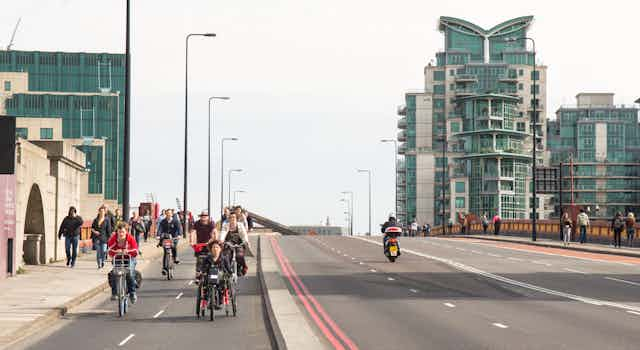In London, cycling is starting to be seen as a key part of the solution to the city’s looming transport problems. We simply can’t go on in the old way – if we don’t cut car use, the city will choke and traffic will grind to a halt. With nearly 10,000 Londoners killed each year by air pollution, clean modes of transport such as cycling will be vital to creating a more liveable city. What’s more, London is experiencing unprecedented population growth, so unless we can get more people on their bikes, we’ll see strained public transport systems and worsening congestion.
The city desperately needs a mayor who will bring cycling into the mainstream, rather than considering it a fringe form of transport. The main thing people say stops them taking up cycling is their unwillingness to mix with motor traffic. So, can the candidates who are currently leading the polls commit to the changes we need? I took a look at the manifestos of Labour’s Sadiq Khan and the Conservatives’ Zac Goldsmith, to find out.
If London is truly to become a city of mass cycling, the next mayor will need to invest in a dense network of direct routes, which entail little or no mixing with motor traffic. This network would be comprised of three key elements: protected tracks on busy roads; routes through parks and other green spaces; and quieter streets with little motor traffic. In London, these have been called cycle superhighways, greenways and quietways respectively.
Infrastructure is not the only issue – for instance, better traffic enforcement will also be important. But the priority is creating an “8-80” network – accessible for users of all ages – situating the bike as the default mode of transport for many short trips. London’s still a long way from this goal, despite some high-quality, high-profile new schemes. So, what would Khan and Goldsmith do to bring cycling into the mainstream?
What’s Goldsmith got?
Goldsmith’s transport manifesto promises “a new deal for cyclists”. This may sound promising – but to make cycling a mass mode of transport, we need to focus less on “cyclists” and more on people who aren’t yet cycling.
The first three sections of the manifesto only mention cycling briefly, to criticise pedicabs. Goldsmith leaves the cycling pledges to the fourth section, on air pollution. It’s disappointing that he seems to view cycling as only an environmental issue, as important as that is. Cycling’s potential to keep London moving or reduce congestion goes unmentioned – even though bikes are much more space efficient than cars.
Instead, the Conservative candidate’s focus is on extending cycle hire, making safety requirements for trucks more rigorous and extending Transport for London’s junction review process. What about new bike routes? It needs “community consent”, implying that – unlike some other major schemes Goldsmith proposes – usual consultation processes are not enough. If “residents’ fears about congestion are borne out”, cycle superhighway schemes could be scrapped.
Khan’s contribution
Sadiq Khan’s manifesto includes a section on “a modern and affordable transport network”, which contains pledges on cycling and walking, with a strong focus on safety. Again, it’s a shame not to see cycling discussed as a way of “keeping London moving” – if delays to motorists harm “business competitiveness”, isn’t the same true for delays to pedestrians and cyclists?
Nevertheless, cycling infrastructure features prominently, with promises to increase spending and build more separated routes on main roads. Mention is made of completing and extending “town-centre improvement plans”, which outgoing mayor Boris Johnson called mini-Hollands. These have potential to overcome the delivery problems that beset quietways, by focusing on improving local areas rather than just cycle routes. Although Khan still hasn’t really made cycling mainstream in his manifesto, the content is better.
Still, both main candidates are arguably outshone by the Green Party’s Sian Berry, and the Liberal Democrats’ Caroline Pidgeon. Berry’s manifesto shows the strongest grasp of the scale of change needed, while Pidgeon’s pledges 3% of TfL’s budget for cycling. Whoever wins, I suspect continued pressure from Londoners, businesses, health organisations and others will be needed to ensure that cycling is seen as a core part of London’s future – not just something for “cyclists”.

